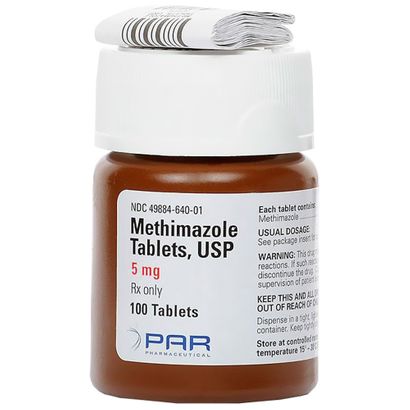SAVE 20% OFF 20% OFF Use Code PREZ20 *

Methimazole for Cats - 5mg (100 tabs) (Manufacturer may vary) - [Thyroid Support]
- Description
- Directions
- FAQ
- Reviews
Description
Methimazole is used to treat hyperthyroidism in cats. Methimazole is used to treat overactive thyroid (hyperthyroidism). It is also used before thyroid surgery or radioactive iodine treatment. It has largely replaced propylthiouracil in this treatment process since it has a lower incidence of adverse side effects.
Key Benefits
- Effectively treats hyperthyroidism in cats
- Rapid results
- Affordably sold per tablet
- Lower incidence of adverse side effects than propylthiouracil
How It Works
Hyperthyroidism is a condition that occurs when the thyroid gland produces too much thyroid hormone. Methimazole inhibits the production of thyroid hormones.
Indications
Methimazole is indicated in the medical treatment of hyperthyroidism. Long-term therapy may lead to remission of the disease. Methimazole may be used to ameliorate hyperthyroidism in preparation for subtotal thyroidectomy or radioactive iodine therapy. Methimazole is also used when thyroidectomy is contraindicated or not advisable.
Directions
- Methimazole is a prescription medication used by veterinarians to treat overactive (hyper) thyroid in cats.
- Methimazole is not FDA approved for use in veterinary medicine; however, it is a commonly accepted practice for veterinarians to prescribe this medication for cats.
- Methimazole is also used before thyroid surgery or radioactive iodine treatment.
- Periodic blood tests will be necessary while the cat is taking this medication.
Tip: Do not use in pregnant or nursing animals. Methimazole can be given with or without food.
| Dosage for Cats: | |
|---|---|
| Weight | Dosage |
| All weights | The usual initial dose varies from 2.5-5mg 2 or 3 times a day. Periodic blood testing is required to monitor liver function and for any toxic effects on blood cells |
Caution:
Blood tests must be done to check for proper dosage. Do not use in pregnant or nursing animals. Do not give your pet a live vaccine while giving methimazole. Contact your veterinarian immediately if your pet develops signs of an infection.
Precautions:
- Do not use in pregnant or nursing animals
- Do not give your pet a live vaccine while giving methimazole
- Methimazole can increase the risk of bleeding.
- Methimazole can lower the blood cells that help fight infections.
- Do not stop giving this medication to your pet, if the medication is stopped, the symptoms will reappear and result in life threatening symptoms
- Tell your veterinarian if your pet has an allergy to methimazole or if your pet has liver disease, a blood cell disorder, or a weak immune system.
- Tell your veterinarian if the pet is pregnant or nursing.
Inform your veterinarian of any other medications, including vitamins and supplements your pet may be taking while receiving methimazole. Tell your veterinarian if your pet is taking theophylline Theo-Dur, warfarin Coumadin, digoxin Lanoxin, a beta blocker such as atenolol Tenormin, metoprolol Lopressor, or propranolol Inderal. Drugs other than those listed may also interact with Methimazole. Talk to your veterinarian or pharmacist before giving any prescription or over the counter medicines.
Possible Side Effects:
If any of the following serious side effects occur, stop giving methimazole and seek emergency veterinary medical attention an allergic reaction difficulty breathing swelling of the lips tongue or face hives.
Stop giving methimazole and contact your veterinarian at once if your pet develops any of these serious side effects fever, chills, body aches easy bruising or bleeding, unusual weakness blood in the urine or stools severe blistering, peeling, and skin rash nausea, low fever, loss of appetite, dark urine, jaundice.
Other less serious side effects may occur. Continue giving methimazole and talk to your veterinarian if your pet experiences headache, drowsiness, dizziness mild nausea, or vomiting itching muscle, joint, or nerve pain swelling hair loss.
Other side effects may also occur. Talk to your veterinarian about any side effect that seems unusual or bothersome to the animal.
Storage:
Store methimazole at room temperature, away from moisture and heat.
FAQ
Reviews
- great price
- fast shipping
- responsive customer service
- Allow enough time to initially get your pet's prescription set up as the company doesn't process new prescriptions on weekends.



